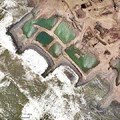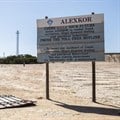The state mining company is challenging an environmental compliance notice.
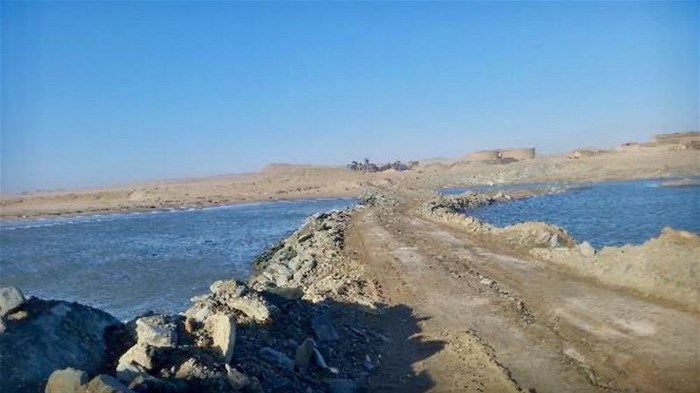
The Alexkor coffer-dam wall between two dams at high tide. Photos from a Department of Forestry, Fisheries and the Environment report titled: “Enforcement: In Loco Inspection Report – The salt/tidal flats of the Orange River Mouth Ramsar site”, published 28 January 2020.
- State diamond mining company Alexkor is challenging a compliance notice issued by the environment department over its Namaqualand beach mining operations
- Alexkor was ordered to stop using rocks in coffer-dam construction and to apply for authorisation.
- Alexkor is questioning the legal competency of the environment department’s Green Scorpions to issue such notices for mining in the coastal zone.
Two state entities – diamond mining company Alexkor and the national Department of Forestry, Fisheries and Environmental Affairs (DFFE) – are squaring up for a major legal battle over the use of rock-based coffer-dams in beach mining operations for diamonds around the Orange River estuary on the Namaqualand coast.
Alexkor is challenging a DFFE July 2021 decision to issue it with a Compliance Notice in terms of the Integrated Coastal Management Act, one of a suite of acts under the umbrella National Environmental Management Act (Nema) that are administered by the department.
The notice required the mining company to stop using rocks to armour the walls of its beach coffer dams within 15 days. Alexkor had 60 days to submit an updated report that would “adequately” address concerns about the impact of rock-based coffer-dams on the coastal environment, as well as methods to remove such rock and rehabilitate the coastal environment. The report had to be supported by “proper quantitative analyses, biological surveys and baseline data”, and its contents implemented after approval by the department.
Alexkor objected to the compliance notice, but its objection was finally dismissed by environment minister Barbara Creecy late last year.
The mining company has now turned to the courts with a review application under the Promotion of Administrative Justice Act (Paja) to overturn Creecy’s decision.
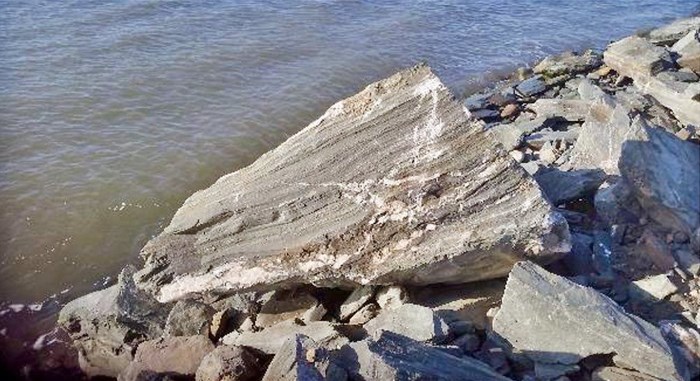
Rocks on the coffer dam wall.
According to papers filed in the Gauteng High Court in Pretoria, Alexkor was warned by a specialist consultant as far back as 1994 that rocks (quarried “mafic” rocks) used to armour or reinforce the walls of coffer-dams to hold back the sea during mining operations were severely damaging the coastal environment and should not be used in future.
“Under no circumstances should gravel, cobbles or boulders be used in coffer dam mining operations,” the specialist’s report stated.
But according to three assessments of Alexkor beach mining sites conducted by DFFE officials during 2019/20, this warning had been ignored.
One assessment states that the coffer dams had caused “extensive, potentially irreparable, and unnecessarily severe damage to the nearshore marine environment”.
Jurisdiction
But the review application is not primarily about environmental damage and the possible rehabilitation of coastal mining sites. Instead, it is focused on who has legal jurisdiction to grant environmental authorisation for Alexkor’s use of such dams and to monitor its beach mining operations.
The mining company maintains that it obtained environmental authorisation from the Northern Cape provincial environment department in December 2013 to use mafic rock in the construction of coffer-dams, and that it holds an approved environmental management programme dating from 1994 and amended in 2018.
Alexkor argues that, since the introduction of the “One Environmental System” in December 2014, its operations are regulated and monitored by the national Department of Mineral Resources and Energy.
The compliance notice was served on it by DFFE environmental inspectors – the Green Scorpions – and is therefore unlawful, it claims.
The environment department, however, says in its court papers that the use of mafic rock for coffer-dams constitutes dumping at sea, and that this an activity regulated by the Integrated Coastal Management Act (NEM:ICMA).
Creecy says her department is the only authority that can issue environmental authorisations for any “listed activities” under this Act, and that these activities include dumping rocks during coffer-dam construction.
Also, because Alexkor constructed coffer-dam walls partly on coastal land, this has resulted in land reclamation, which is another activity requiring specific environmental authorisation under the management act.
Furthermore, the Northern Cape officials had no legal standing to approve Alexkor’s beach mining operations, the department argues.
DFFE has also laid criminal charges against Alexkor for its use of coffer-dams.
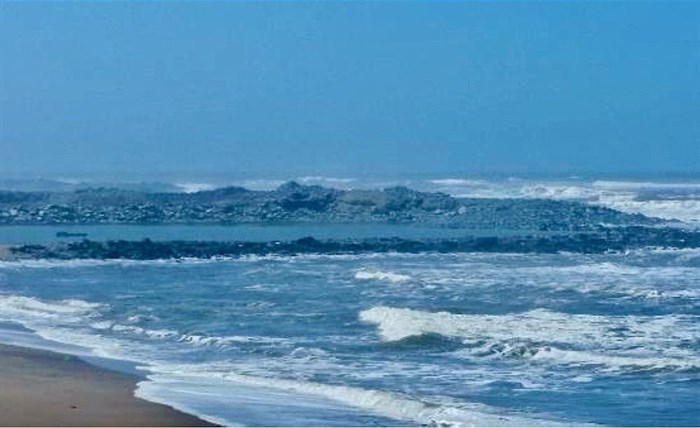
Coffer dam wall at low tide.
The issue has been brewing for more than a decade. By its own admission, Alexkor unlawfully started upgrading its coffer-dams with rock reinforcement on the Namaqualand coastline in 2012, completing the first one in May 2013.
Realising there were legal problems, in 2014 the mining company initiated a so-called Section 24G rectification application for contravening the provisions of NEMA relating to coffer dam use. But it never followed through with this application which then lapsed in June 2015.
In response to “numerous reports” about the potential negative impacts of coffer-dams on the coastal environment of the Northern Cape over several years, department officials conducted site visits to Alexkor’s mining operations around the Orange River estuary in December 2019 and May 2020.
Following these visits, in November 2020 the mining company was issued with a notice of intent by the department to issue it with a pre-compliance notice, and Alexkor was given an opportunity to comment.
In December 2020, Alexkor responded, but this was deemed inadequate, and on 29 July 2021, a full Compliance Notice was issued.
“The Compliance Notice had to do with the failure to obtain the required NEM:ICMA authorisations and the resultant pollution and coastal environmental degradation as a result of the activities conducted by the applicants,” Creecy states in an affidavit.
On 22 August 2021, Alexkor submitted an objection to the compliance notice and requested that the notice be suspended pending finalisation of its objection. But it was informed by the department on 30 September 2021 that its request for suspension had been unsuccessful.
On the first two days of 2022, department officials inspected the mining sites to establish whether Alexkor had complied with the compliance notice instructions.
A report compiled on 7 February 2022 confirmed that the company had not complied with the notice because it was still using mafic rock in coffer-dam construction and had not submitted a report for approval, as required.
On 24 October 2022, Creecy dismissed Alexkor’s objection to the compliance notice, although she suspended a decision on the mining company’s argument that it did not require either a dumping permit or authorisation for reclamation of land in the coastal zone. But Creecy subsequently dismissed these arguments in her final decision, signed on 15 December 2023.
Alexkor has now instituted a judicial review under the Promotion of Administrative Justice Act.
Alexkor is the first applicant in the case. The second is the Pooling and Sharing Joint Venture, the cooperative entity formed by the state mining company and the local Richtersveld community after their successful land claim that included mineral rights.
The first respondent is the Department of Forestry, Fisheries and Environmental Affairs and the second is Creecy, who filed the answering affidavit for both.
The Department of Mineral Resources and Energy is the third respondent.
At the time of writing, the respondents were still waiting for Alexkor to file its Replying Affidavit in court.
Alexkor has not yet responded to a request from GroundUp for comment.
This article was originally published on GroundUp.
© 2024 GroundUp. This article is licensed under a Creative Commons Attribution-NoDerivatives 4.0 International License.




































